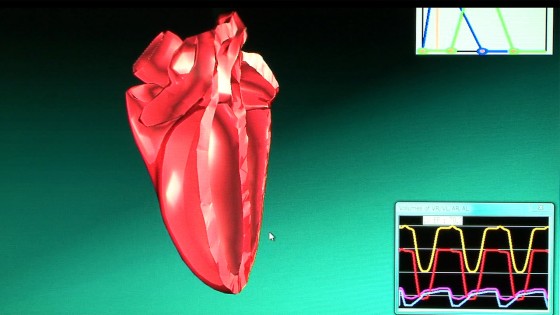
Robohub.org
Real-time heart beat simulator visualizes pulsation and disease on a Laptop PC

This simulator can represent the complex pulsation of the heart. It is being developed by a group including members from National Cerebral and Cardiovascular Center and Riken.
Until now, simulating heart pulsation has required huge amounts of computing, done by supercomputers or offline. But this new system makes it possible to visualize heart pulsation on a notebook PC in real time, by applying computer graphics technology.
 “Previously, simulation methods were based on mechanics. Our method is completely new because we use technology called shape matching, based on shape constraints. To put it simply, we divide a heart model into 7,000 parts, and make each part contract independently. The main point about this method is that it calculates the shape of the heart overall by minimizing contradictions between the contracted parts.”
“Previously, simulation methods were based on mechanics. Our method is completely new because we use technology called shape matching, based on shape constraints. To put it simply, we divide a heart model into 7,000 parts, and make each part contract independently. The main point about this method is that it calculates the shape of the heart overall by minimizing contradictions between the contracted parts.”
“The 3D heart model can be created by extracting regions from a patient’s CT scan. The course of the cardiac muscle fibers has already been designed. The timing of contraction can be specified through this graph. Normally, the atrium contracts first, then the ventricles.”
Because the heart model runs in real time, it’s possible to deform the heart by applying tension, and to observe cross-sections. Additionally, heart attacks can be simulated by stopping the motion and painting a region. This also makes it possible to create virtual heart disease.
“First of all, we’d like to utilize this simulator in clinical practice. Its primary purpose is to help physicians and patients communicate with each other. Another purpose is to help train physicians. We’d also like to use it simply for elementary education.”
The remaining issues that need to be overcome include, reducing the complexity of creating individual patients heart models, as well as finding ways to handle complex patterns such as ventricular fibrillation.
tags: c-Health-Medicine, cx-Research-Innovation, Simulation





